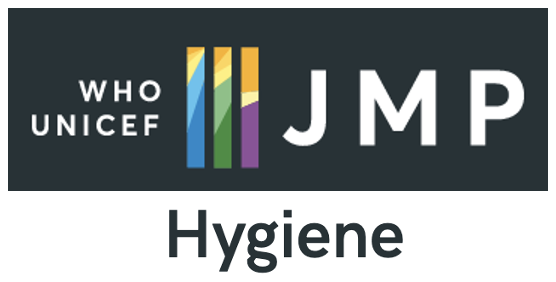Difference between revisions of "Survey Library / Standards: WASH & Health / JMP Household Hygiene"
From Akvopedia
(Published from sandbox) |
(No difference)
|
Revision as of 07:45, 7 December 2020
| Standard Profile | |||||
| Name | Joint Monitoring Program (JMP): Household Hygiene | ||||
| Sector | Water Sanitation and Hygiene (WASH) | ||||
| Creator | WHO and UNICEF | ||||
| What the standard measures |
Proportions of the population nationally, regionally and globally:
| ||||
| Priority indicators |
Proportions of the population that uses:
Indicator details are elaborated in this JMP Methodology document. | ||||
| Links to SDGs |
1.4, SDG indicator definitions are explained in this document. | ||||
| Key users of the standard |
| ||||
| How users analyze data | Household hygiene service levels are calculated based on responses, and then households are classified on the JMP Hygiene Service Ladder for further analysis:
Service levels and priority indicators are monitored at national, regional, and global levels. | ||||
| How users act on data | Data is used to:
The JMP Hygiene service ladder is used to classify, baseline and compare hygiene services across regions, countries and communities. | ||||
| How users create reports aligned with the standard | Reporting is coordinated at the country level by national statistical offices and key sector institutions (i.e. ministries of water, sanitation and hygiene, regulators of sanitation and hygiene services) | ||||
| Where users submit reports | National committees responsible for SDG monitoring and reporting | ||||
| Languages in which standard is available | English | ||||
| Standardized survey template(s) |
JMP Core Questions on Hygiene* *JMP Core questions on Hygiene are explained in the 2018 Update Core questions on water, sanitation and hygiene for household surveys document. | ||||
| Digitized in Akvo Flow | |||||
| Excel versions of Standardized surveys | |||||
| Standardized data visualization dashboards | JMP Household Hygiene | ||||
| Standardized Survey Profile Form (SSP) | JMP Household Hygiene | ||||
| Date standard was last updated | 2020 | ||||
| Current version of standard (# or name) | Not versioned | ||||
| Source | https://washdata.org/monitoring/hygiene | ||||

